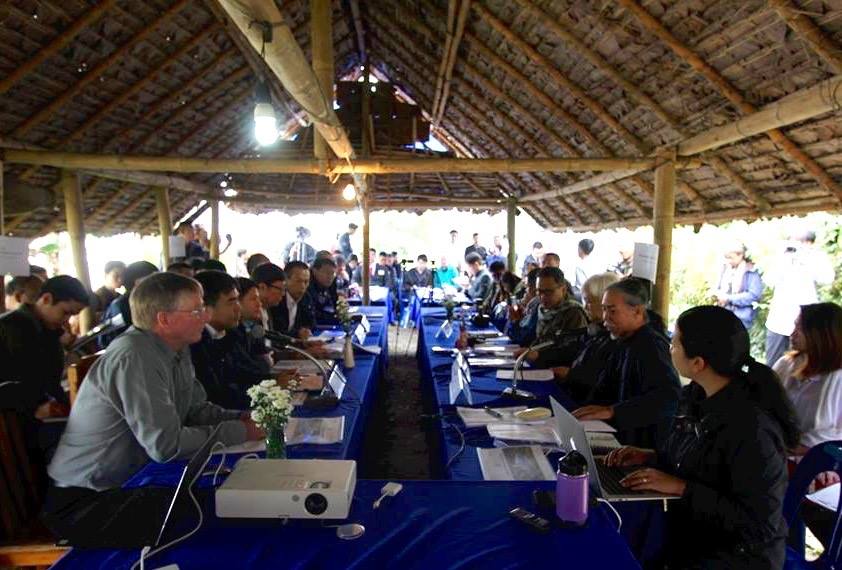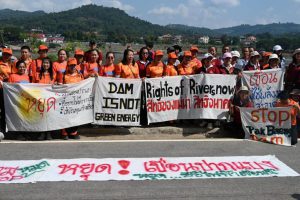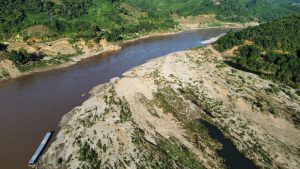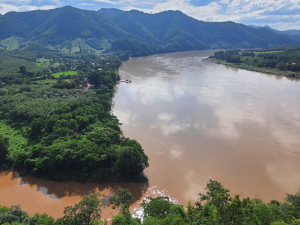Statement by the Thai Mekong People’s Network in Eight Provinces from the 1st Dialogue with Datang (Lao) Pak Beng Hydropower Co. Ltd. on 17
We, Thai Mekong People’s Network from Eight Provinces, declare our position from the Dialogue with Datang (Lao) Pak Beng Hydropower Co. Ltd.. We demand an integrated assessment of the Mekong dam cascade, including Xayaburi, Sanakham, Pak Beng and Don Sahong Dams. We support a Dialogue that builds on an evidence-based body of knowledge, and confirm our interest in an ongoing dialogue process.
The 1st Dialogue between the representatives from Datang (Lao) Pak Beng Hydropower Co. Ltd. and representatives from Mekong Communities took place on 15 January 2018 at Chiang Khong, Chiang Rai, Thailand.
At the Diaolgue, we, the Thai Mekong People’s Network from Eight Provinces, declared our firm position and unwavering commitment to protect the Mekong River and people’s livelihoods in the Mekong River Basin.
We call this River ‘Mae Nam Khong’ or ‘Mother River’. Mae-Nam in Thai, Lao language and Khmer (Tonle) means the one who gives birth, the mother. Khong is the river that belongs to all of us. The Mekong River is an international river that shared by six countries. Development, decision-making, and transboundary water governance for an international river like the Mekong must take an inclusive approach and be based on principles of justice and equity. This means respecting the rights of the Mekong People – those who rely directly on the River and its resources for their lives and livelihoods. The needs of all stakeholders must be taken into account, especially those of grassroots communities. Inclusive development that considers the voices of Mekong People and is knowledge-based is fundamental to sustainable development in the Mekong.
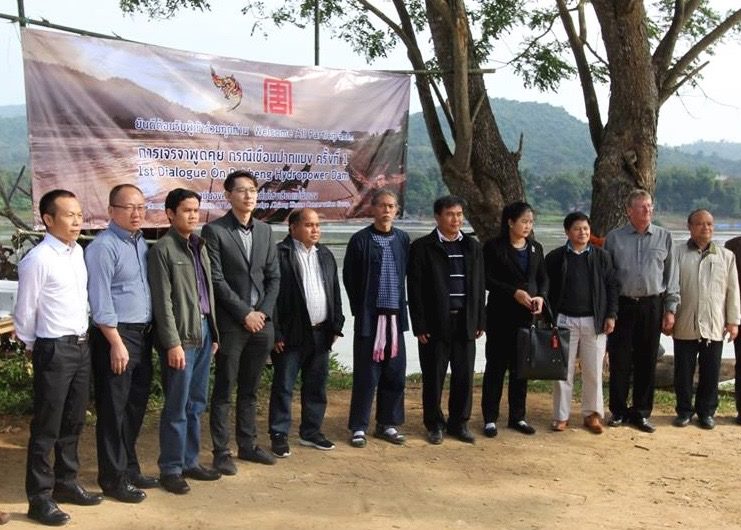
We note that we were contacted to engage in a meeting and dialogue with Chinese Datang (Lao) Hydropower Co. Ltd. However, just 30 minutes prior to the meeting, we were informed that representatives from the Government of Lao PDR would join the Dialogue and play the lead role in providing information in response to our concerns. The Dialogue Team was led by Dr. Chansavaeng Bu-Nhong, Director General of Policy and Energy Planning, Ministry of Energy, Lao PDR. The dialogue team also included an expert/consultant from Norconsult, who provided information about the Pak Beng hydropower dam including technological aspects, benefits, fish passage and flooding issues.
At the Dialogue, we declared our position to initiate and support an integrated assessment of dams within the Mekong River Basin, including the impacts from the upper dam cascade in China and the cumulative impacts of existing and proposed projects to downstream livelihoods of the Mekong communities. The upstream cascades and its operations have resulted in massive environment and social impacts over the past two decades. It is fundamentally important to review and assess those impacts from the whole cascades, not single out and base discussion at a dam-by-dam scale. Additionally, an innovative process which is more inclusive to voices of the Mekong communities must be initiated. Alternatives to river development and energy policies that destroy and degrade the natural resources of current and future generations must form a central part of the Dialogue.
We declared our position at the Dialogue that it is vague and pointless to discuss only the impacts of a single dam such as Pak Beng without taking into account other dams in the Lower Mekong part; including Sanakham, Xayaburi, Don Sahong, and other planned dams on our shared river which will compound the impacts of any single project.
To secure the sustainable development of the Mekong River, we must ensure transboundary water governance and management based on principles of equity, and justice. Such transboundary water governance requires the sustainable use of the river and its resources, equal benefit-sharing from river development and resources, and access to justice. Communities who live downstream of hydropower project must benefit equally from river development upstream.
The Dialogue with Datang (Lao) Pak Beng Hydropower Co. Ltd on 15 January 2018 was the initial meeting in a dialogue process. It was neither a consultation, nor was it an opportunity to seek or obtain consent from Mekong communities. We support future dialogue with Datang. Furthermore, we request a dialogue process that builds on local knowledge of Mekong communities, quality and comprehensive scientific research on environment and social impacts, as well as solid evidence and voices of the Mekong communities. The Dialogue must be inclusive in order to inform fair and just decision making on development of the Mekong River.
We, grassroots communities of the Mekong, must take part meaningfully in the decision making process of the Mekong and its regional resources. Our voices must be heard. We conclude from the Dialogue that the existing information regarding the impacts of the Pak Beng Dam remains limited and inadequate for making important decisions about whether the project should proceed.
Lastly, we must continue sharing information, and use local and jointly created knowledge to support and inform our future dialogue process. We support the idea of continued dialogue on the Pak Beng Dam in order to collaboratively build up a body of knowledge about our Mekong River, promote holistic river development and an integrated assessment of impacts – including an integrated assessment of the Mekong dam cascade. We believe that such collaboration will lead us to sustainably protect the Mekong River and its resources for the next generation.

